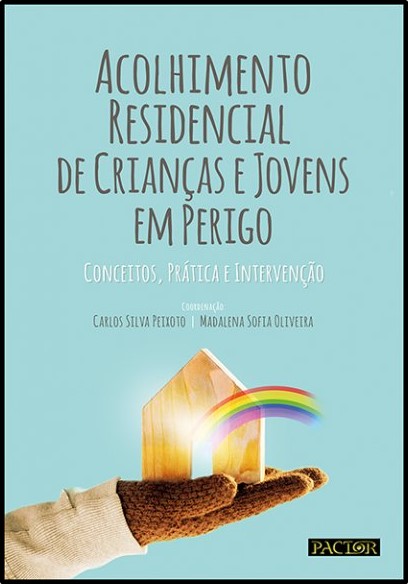A NEW BOOK ON THERAPEUTIC RESIDENTIAL CARE IN PORTUGAL (2021)
Date added: 16/02/22
 Residential Reception of Children and Youth in Danger - Concepts, Practice and Intervention (Acolhimento Residencial de Criancas e Jovens em Perigo) (2021) Editors - Carlos Silva Peixoto and Madalena Sofia Oliveira.
Residential Reception of Children and Youth in Danger - Concepts, Practice and Intervention (Acolhimento Residencial de Criancas e Jovens em Perigo) (2021) Editors - Carlos Silva Peixoto and Madalena Sofia Oliveira.
This book is the first major publication on therapeutic residential care for children and young people in Portugal.
“It is intended to provide an understanding of childhood traumas, how they affect child development, and how we can work with traumatized children and youth to facilitate their recovery.
The daily work in Homes for Residential Reception is presented with children and young people who have been traumatized by abuse and neglect, showing that any context, situation and action in daily life is an opportunity to encourage therapeutic changes.
For the conception of this work, national and foreign professionals and researchers were invited, from different scientific areas, to create a multidisciplinary team. The themes dealt with here are based, in addition to research produced in academia, on the practices, challenges, dilemmas and success of professionals who daily work in a residential care context. It also systematizes important and significant information for an articulated, concerted and networked intervention in the field of Promotion and Protection.
This book is, therefore, essential reading for students and researchers, as well as an important tool for professionals in the social, human, educational and health areas involved in the System for the Promotion and Protection of Children and Youth in Danger, specifically in the measure of placement in residential care.” (Vania Reis, 2021)
The book chapters are written in Portuguese, Spanish, mine are in English and it can be purchased here,
You can also share this information through social networks: Facebook Instagram
In this video, there is an interesting short speech by Richard Rollinson (@1 hr. 22 mins, 50 secs). I am sure the whole video is interesting, unfortunately, my Portuguese needs much improvement! Richard has been a consultant in Portugal and was previously Director at the Mulberry Bush Therapeutic School in England.
Therapeutic Residential Care in Portugal
In 2018, I began working with Lar de Nossa Sr.ª do Livramento in Porto, Portugal, to develop a therapeutic model of care. Their service is for 40 girls and young women who live in a residential service. The history of this service goes back over 200 years. The organization successfully gained European funding for this important project, which was the first of its kind in Portugal. In 2019 we created the Livramento Therapeutic Model of Intervention. In 2020 we worked on the implementation of it.
In 2020 I was also asked by Carlos Silva Peixoto and Madalena Sofia Oliveira to contribute two chapters to this book. It was a privilege for me to do so. The book is an extensive work, including over 50 contributors, contributing to the first book of its kind on residential therapeutic work with children in Portugal. The chapters are in English, Spanish, and Portuguese. My two chapters are on, Assessment of Needs, and Transition Planning: Leaving a Residential Care Home. Here are the chapter introductions.
Assessment Of Needs
Assessment can be considered as a way of evaluating the present situation, how history has impacted upon this and what may be needed for the future. A useful assessment of a child will give us a clear picture of how she or he is today. But there are many ways an assessment can be carried out. For example, the particular focus of the assessment and who does it. There are probably hundreds of assessments that can be used for different or similar purposes. For children and young people who are either in or possibly entering the care system, we need a holistic assessment. It will look at all aspects of development and functioning. It should highlight current strengths and capabilities as well as vulnerabilities and risks. It must include physical, psychological, emotional, spiritual and cultural domains.
The assessment will not only give us a clear picture of the child and her functioning it will also help us understand her history. With this understanding, we will hopefully arrive at a good sense of what the child now needs to help her develop. An effective assessment identifies needs and is not just a diagnosis or a label. Unfortunately, many children entering care have collected a multitude of labels from assessments and not much clarity on what they need. These assessments can provide a narrow view of the child. Perhaps they were only carried out by a doctor, or a psychologist and other important views on the child were left out. Those working with the child are then left trying to piece the fragments together to make sense of her. If we want to understand the whole child and all her needs, we must use an inclusive assessment. One that includes as many experiences of the child as possible. This might include the child herself, family members, other carers, teachers, social workers, doctors, and other professionals.
Transition Planning – Leaving a Residential Care Home
The effective transition for young people out of a residential care home, or any care situation is vitally important to their future. Unfortunately, many young people across the world do not have positive transitions. Osborn and Bromfield (2007) argue, research shows,
…that young people leaving care are one of the most vulnerable and disadvantaged social groups.
Young people leaving residential care are among the most vulnerable (Macdonald and Millen, 2012). It needs to be recognized that there is a significant difference between leaving a care home, and also leaving the legal care of the state, or not. If the state maintains a legal responsibility the change may not be so challenging to manage. This chapter is mostly concerned with young people who are leaving a residential care home and the care system at the same time.
One of the main reasons is the lack of planning. The research of Hannon et al. (2010), found that the quality of plan for a young person’s transition from care is one of the major determinants of the outcomes achieved. Another important factor is the quality of statutory provision to provide ongoing support, especially when the young person may now be an adult. There are many other reasons, which this chapter will refer to. As a result, many young people flounder when leaving care and are vulnerable to such adversities as homelessness and crime. The prison populations in many countries are disproportionately represented by adults who have been in the care system. The Prison Reform Trust (2016) in the UK found that while less than 1% of the general population had been in care, over 50% of the prison population were care leavers. Sadly, this pattern is not an isolated one. Policy Matters (2011) in the USA claim that up to 30% of foster care youth are homeless within 2 years of leaving care, and a similar number will be in prison at some point in their lives.
Fenton (2015, p.291) in Ireland, argues that it is not so much that young people leave care, but that care leaves them,
With regard to the term ‘care leavers, the reality for many of these young people is that care leaves them regardless of their ability to function without it, and often within what should be a managed process but in reality becomes an event over which they have little or no control…After care for these young people really means that care has gone, posing the question – what and who is left after care has gone.
References
Fenton, M. (2015) Social Care and Child Welfare in Ireland: Integrating Residential Care, Leaving Care and After Care, The Liffey Press: Dublin
Osborn, A. and Bromfield, L. (2007) Young People Leaving Care: NSCPC Research Brief 7, Australia Institute of Family Studies: Melbourne, https://aifs.gov.au/cfca/publications/young-people-leaving-care
Files
Please leave a comment
Next Steps - If you have a question please use the button below. If you would like to find out more
or discuss a particular requirement with Patrick, please book a free exploratory meeting
Ask a question or
Book a free meeting













